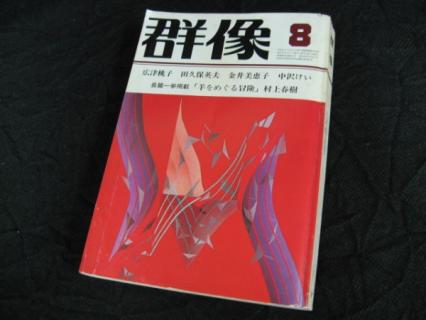Welcome to the Eighth Annual How to Japanese Murakami Fest!
With the goal of stirring up even more interest in Murakami between now and October, when the Nobel Prizes are announced, I will post a small piece of Murakami translation/analysis/revelation once a week from now until the announcement. You can see past entries in the series here:
Year One: Boobs, The Wind, Baseball, Lederhosen, Eels, Monkeys, and Doves
Year Two: Hotel Lobby Oysters, Condoms, Spinning Around and Around, 街・町, The Town and Its Uncertain Wall, A Short Piece on the Elephant that Crushes Heineken Cans
Year Three: “The Town and Its Uncertain Wall” – Words and Weirs, The Library, Old Dreams, Saying Goodbye, Lastly
Year Four: More Drawers, Phone Calls, Metaphors, Eight-year-olds, dude, Ushikawa, Last Line
Year Five: Jurassic Sapporo, Gerry Mulligan, All Growns Up, Dance, Mountain Climbing
Year Six: Sex With Fat Women, Coffee With the Colonel, The Librarian, Old Man, Watermelons
Year Seven: Warmth, Rebirth, Wasteland, Hard-ons, Seventeen, Embrace
Year Eight: Pigeon
The Complete Works combines Hear the Wind Sing and Pinball, 1973 into a single volume, much like the recent new translation of both novels, and Murakami spends most of his time in 自作を語る discussing the first novel. He has a few interesting things to say about Pinball, notably that the incorporation of a “search” was useful for him in terms of plot structure (something the first book didn’t have much of). It’s something he’s gone back to a number of times.
He also says that he didn’t make any changes to these first two novels:
そしてこれが夜中に台所のテーブルで書きあげられた最後の長編小説となった。このあと僕は生活をがらりと変えて、フルタイムの専業作家としてやっていくことになる。そういう意味で、僕はこの最初のふたつの小説に僕なりの深い個人的愛着を持っている。この二冊の本には様々な思い出がしみついている。楽しいこともあったし、あまり思いだしたくないこともある。この全体に収録するにあたって、多くの短編は多少なりとも加筆しているわけだが、この二作についてはまったく筆を入れなかった。入れ始めるときりがないだろうと思ったせいもあるが、あえて入れたくないという気持ちの方が強かった。先にも書いたように、このふたつの作品はある種の不完全さと表裏一体となって成立していると思うからである。読者のみなさんにはあるいは御不満もあるかもしれない。でも理解していただきたい。これが僕だったのだし、結局のところどこまでいってもこれが僕なのだ。
(Pinball, 1973) was also the final full-length novel I wrote at night on my kitchen table. Shortly after, I completely changed my lifestyle and made a go of it as a dedicated full-time writer. In that sense, I have my own personal deep sense of attachment to these first two novels. All sorts of memories are ingrained in these two books. There were fun things as well as things I don’t really want to remember. In the process of putting together this Complete Works, I made minor revisions to most of the short stories, but I didn’t lay a finger on either of these two. Partly I felt like if I did start to change them, there would’ve been no end to the revisions, but I also felt very strongly that I shouldn’t dare change anything. This is because, as I mentioned previously, these two works came into being with a certain incompleteness and became tightly linked. As readers, you may be somewhat dissatisfied, but please understand: This was me, and no matter how far I go, it still is me. (VIII)
I’m still reading through the new translation of Pinball, 1973, and I don’t actually have paperback copies of either novel (which generally have the original text), so I can’t confirm whether Murakami’s claim is true or not, but I have finished comparing the two translations of Hear the Wind Sing. While there don’t seem to be any line by line changes, there is at least one somewhat major adjustment.
The new translation ends with Chapter 40, which feels much like a postscript because Murakami spends the short chapter discussing the fictional writer Derek Hartfield (or “Heartfield” in the Birnbaum edition). Birnbaum’s translation, however, has an additional postscript which is labeled as such and is not numbered. Here is what may be the original ending:
Heartfield, Again
(In lieu of a postscript)
If I hadn’t encounter the writer Derek Heartfield, I probably wouldn’t be writing novels. While it’s not for me to say, I surely would have taken up a completely different path from my present one.
When I was in high school, I bought up a number of Heartfield paperbacks that some merchant marine had left in a Kobe secondhand bookstore. Fifty yen apiece they were. If the place hadn’t been a bookstore, I’d hardly have thought them books, they looked so strange. The garish covers were all but torn off, the pulp pages discolored to orange. The books had probably logged on some cargo ship or cruiser along with this common crewman, then rode his bunk across time and the Pacific to wind up on my desk.
* * *
Some years later, I went over to America. A short trip just to visit Heartfield’s grave. Thomas McClure, the enthusiastic (and only) Heartfield scholar, had written me the location. “It’s a small grave,” the letter read, “the size of a high-heel point. Be careful not to miss it.”
From New York I caught a casket of a Greyhound bus and arrived in that tiny Ohio town at seven in the morning. I was the only passenger to get off there. The graveyard lay across a field on the edge of town. A graveyard bigger than the town itself. Overhead the skylarks were singing as they traced circles in the sky.
It look one solid hour to find Heartfield’s grave. I made an offering of some dusty primroses I picked in the surrounding fields, put my hands together in prayer, crouched down, and had a cigarette. There, under the even May sun, life and death both seemed equally cheap. I stretched out face up and closed my eyes, just listening to the skylarks for hours and hours.
The beginnings of this novel are there. Exactly where it has all led, even I have no idea. But as Heartfield would say, “Compared to the complexity of the universe, this world of our is like the brain of a worm.”
I only wish it were so.
* * *
In closing, I’d like to thank the aforementioned Thomas McClure for letting me quote several passages from his magnum opus, The legend of the Sterile Stars (1968), for the sections on Heartfield.
May 1979
(129-130)
It feels like Murakami overwrote his ending, and maybe he realized that when he put together the Complete Works. Perhaps this doesn’t really count as a revision—Murakami isn’t tinkering here but rather just drawing back the tape so that it doesn’t include that last little bit. I wish I had a 文庫本 copy to check the original text. Any readers have one handy?


